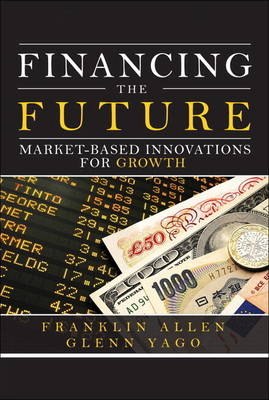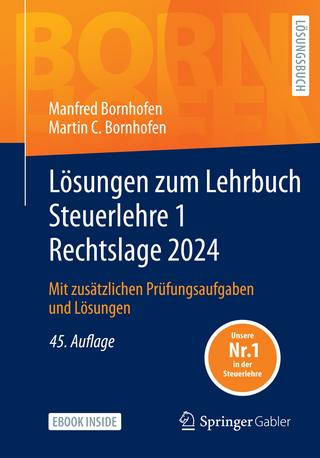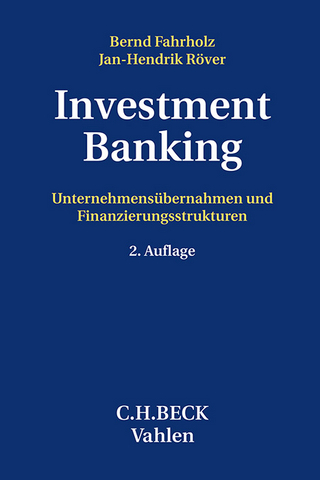
Financing the Future
Financial Times Prentice Hall (Verlag)
978-0-13-701127-8 (ISBN)
- Titel ist leider vergriffen;
keine Neuauflage - Artikel merken
Myron S. Scholes, Nobel Laureate in Economics, 1997, and Frank E. Buck Professor of Finance, Emeritus, Graduate School of Business, Stanford University
“Despite its role in the recent economic crisis, financial innovation, wisely used, can play a crucial role in solving some of the world’s most pressing problems, particularly by delivering sustainable growth and economic development. Allen and Yago’s compelling, contrarian analysis punctures the current gloom about finance, and shows how its creativity can make a huge, positive difference.”
MatthewBishop, New York Bureau Chief of The Economist and co-author of Philanthrocapitalism and The Road from Ruin: How to Revive Capitalism and Put America Back on Top
“This book provides a clear and concise history of financial innovation as an engine for growth in various fields--an often ignored or misunderstood topic. From its role to help finance new industries and technologies to upcoming advances in environmental and health areas, it will prove an important reference to those of us who are interested in how ingenuity in capital markets can help advance social goals. A must-read in these times.”
Richard L. Sandor, Chairman and Founder, Chicago Climate Exchange; Executive Chairman, Climate Exchange plc
“The right book at the right time. Allen and Yago colorfully relate the history of financial innovation down through the ages. With facts and analyses, they restore the concept of financial innovation to its rightful place: a medium by which long-standing problems of social, economic, and environment have been addressed, sometimes solved.”
Lewis S. Ranieri, Ranieri Partners LLC
“From housing to microfinance to drug development, Allen and Yago explore the important role financial innovation plays around the world. The authors prove in plain English the vital role creative finance played in building America and why stifling innovation poses a risk to our financial future.”
Brian Sullivan, Fox Business
Financial innovation can drive social, economic, and environmental change, transforming ideas into new technologies, industries, and jobs. But when it is misunderstood or mismanaged, the consequences can be severe. In this practical, accessible book, two leading experts explain how sophisticated capital structures can enable companies and individuals to raise funding in larger amounts for longer terms and at lower cost--accomplishing tasks that would otherwise be impossible.
The authors recount the history and basic principles of financial innovation, showing how new instruments have evolved, and how they have been used and misused. They thoroughly demystify complex capital structures, offering a practical toolbox for entrepreneurs, corporate executives, and policymakers.
Financing the Future presents clear, thorough discussions of the current role of financial innovation in capitalizing businesses, industries, breakthrough technologies, housing solutions, medical treatments, and environmental projects. It also presents a full chapter of lessons learned: essential insights for stabilizing the economy and avoiding pitfalls.
Distinguishing genuine innovation from dangerous copycats
Crafting sustainable financial innovations that add value and manage risk
The best tools for the job: choosing them, customizing them, using them
Selecting the right instruments and structures, and making the most of them
Financial innovations for business, housing, and medical research
Finding new and better ways to promote entrepreneurship and advance social goals
Innovating to save the planet and help humanity
The power of finance to protect natural resources and alleviate global poverty
This is the first in a new series of books on financial innovation, published through a collaboration between Wharton School Publishing and the Milken Institute. Future titles will focus on specific policy areas such as housing and medical research.
The Milken Institute is an independent economic think tank whose mission is to improve the lives and economic conditions of diverse populations in the United States and around the world by helping business and public policy leaders identify and implement innovative ideas for creating broad-based prosperity. It puts research to work with the goal of revitalizing regions and finding new ways to generate capital for people with original ideas.
Franklin Allen is the Nippon Life Professor of Finance and Professor of Economics at the Wharton School of the University of Pennsylvania, where he has been on the faculty since 1980. A current codirector of the Wharton Financial Institutions Center, he was formerly vice dean and director of Wharton Doctoral Programs, as well as executive editor of the Review of Financial Studies, one of the nation’s leading academic finance journals. Allen is a past president of the American Finance Association, the Western Finance Association, the Society for Financial Studies, and the Financial Intermediation Research Society. His main areas of interest are corporate finance, asset pricing, financial innovation, comparative financial systems, and financial crises. He is a coauthor, with Richard Brealey and Stewart Myers, of the eighth and ninth editions of the textbook Principles of Corporate Finance. Allen received his doctorate from Oxford University. Glenn Yago is director of Capital Studies at the Milken Institute. He is also a visiting professor at Hebrew University of Jerusalem and directs the Koret-Milken Institute Fellows program. Yago’s work focuses on the innovative use of financial instruments to solve longstanding economic development, social, and environmental challenges. His research and projects have contributed to policy innovations fostering the democratization of capital to traditionally underserved markets and entrepreneurs in the United States and around the world. Yago is the coauthor of several books, including The Rise and Fall of the U.S. Mortgage and Credit Markets, Global Edge, Restructuring Regulation and Financial Institutions, and Beyond Junk Bonds. He was a professor at the State University of New York at Stony Brook and at the City University of New York Graduate Center. Yago earned his Ph.D. at the University of Wisconsin, Madison.
Acknowledgments vi
About the Authors ix
About Milken Institute xi
Chapter 1 The Evolution of Finance 1
Chapter 2 A Framework for Financial Innovation: Managing Capital Structure 27
Chapter 3 Innovations in Business Finance 51
Chapter 4 Innovations in Housing Finance 85
Chapter 5 Environmental Finance: Innovating to Save the Planet 117
Chapter 6 Financing the Developing World 149
Chapter 7 Financing Cures 185
Chapter 8 Six Cardinal Rules of Financial Innovation 215
Appendix The Black-Scholes Formula 225
Index 227
| Erscheint lt. Verlag | 15.4.2010 |
|---|---|
| Verlagsort | Upper Saddle River |
| Sprache | englisch |
| Maße | 232 x 161 mm |
| Gewicht | 479 g |
| Themenwelt | Wirtschaft ► Betriebswirtschaft / Management ► Finanzierung |
| Wirtschaft ► Volkswirtschaftslehre ► Makroökonomie | |
| ISBN-10 | 0-13-701127-X / 013701127X |
| ISBN-13 | 978-0-13-701127-8 / 9780137011278 |
| Zustand | Neuware |
| Haben Sie eine Frage zum Produkt? |
aus dem Bereich


